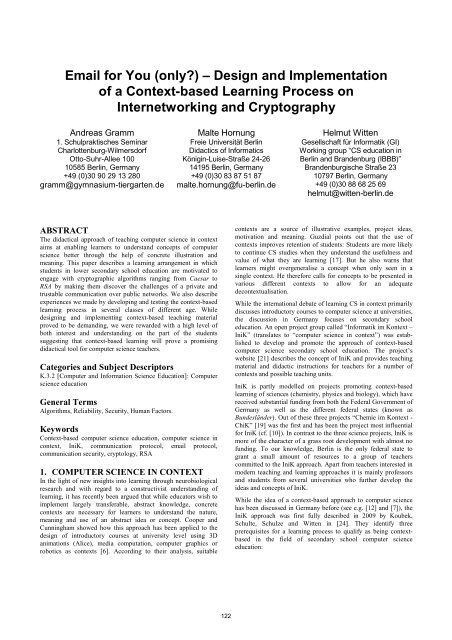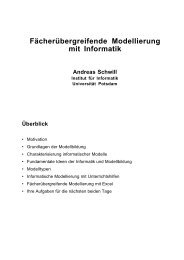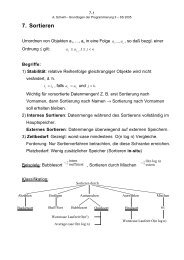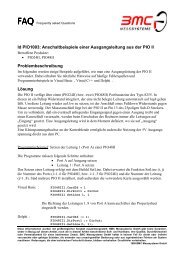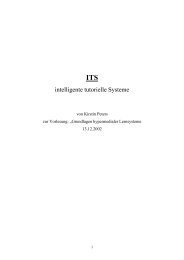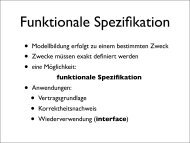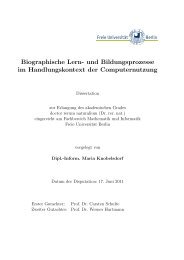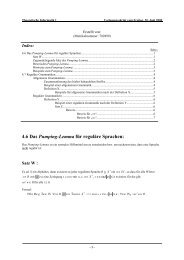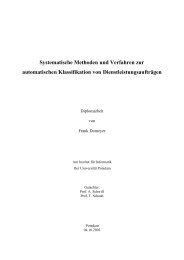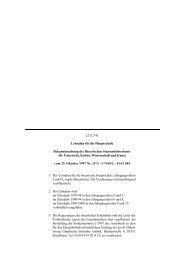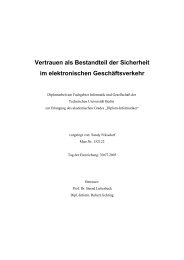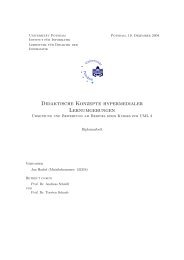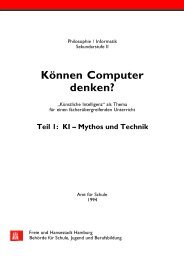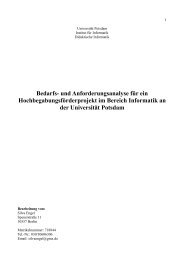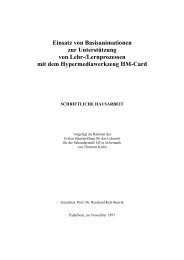Maria Knobelsdorf, University of Dortmund, Germany - Didaktik der ...
Maria Knobelsdorf, University of Dortmund, Germany - Didaktik der ...
Maria Knobelsdorf, University of Dortmund, Germany - Didaktik der ...
You also want an ePaper? Increase the reach of your titles
YUMPU automatically turns print PDFs into web optimized ePapers that Google loves.
Email for You (only?) – Design and Implementation<br />
<strong>of</strong> a Context-based Learning Process on<br />
Internetworking and Cryptography<br />
Andreas Gramm<br />
1. Schulpraktisches Seminar<br />
Charlottenburg-Wilmersdorf<br />
Otto-Suhr-Allee 100<br />
10585 Berlin, <strong>Germany</strong><br />
+49 (0)30 90 29 13 280<br />
gramm@gymnasium-tiergarten.de<br />
ABSTRACT<br />
The didactical approach <strong>of</strong> teaching computer science in context<br />
aims at enabling learners to un<strong>der</strong>stand concepts <strong>of</strong> computer<br />
science better through the help <strong>of</strong> concrete illustration and<br />
meaning. This paper describes a learning arrangement in which<br />
students in lower secondary school education are motivated to<br />
engage with cryptographic algorithms ranging from Caesar to<br />
RSA by making them discover the challenges <strong>of</strong> a private and<br />
trustable communication over public networks. We also describe<br />
experiences we made by developing and testing the context-based<br />
learning process in several classes <strong>of</strong> different age. While<br />
designing and implementing context-based teaching material<br />
proved to be demanding, we were rewarded with a high level <strong>of</strong><br />
both interest and un<strong>der</strong>standing on the part <strong>of</strong> the students<br />
suggesting that context-based learning will prove a promising<br />
didactical tool for computer science teachers.<br />
Categories and Subject Descriptors<br />
K.3.2 [Computer and Information Science Education]: Computer<br />
science education<br />
General Terms<br />
Algorithms, Reliability, Security, Human Factors.<br />
Keywords<br />
Context-based computer science education, computer science in<br />
context, IniK, communication protocol, email protocol,<br />
communication security, cryptology, RSA<br />
1. COMPUTER SCIENCE IN CONTEXT<br />
In the light <strong>of</strong> new insights into learning through neurobiological<br />
research and with regard to a constructivist un<strong>der</strong>standing <strong>of</strong><br />
learning, it has recently been argued that while educators wish to<br />
implement largely transferable, abstract knowledge, concrete<br />
contexts are necessary for learners to un<strong>der</strong>stand the nature,<br />
meaning and use <strong>of</strong> an abstract idea or concept. Cooper and<br />
Cunningham showed how this approach has been applied to the<br />
design <strong>of</strong> introductory courses at university level using 3D<br />
animations (Alice), media computation, computer graphics or<br />
robotics as contexts [6]. According to their analysis, suitable<br />
Malte Hornung<br />
Freie Universität Berlin<br />
Didactics <strong>of</strong> Informatics<br />
Königin-Luise-Straße 24-26<br />
14195 Berlin, <strong>Germany</strong><br />
+49 (0)30 83 87 51 87<br />
malte.hornung@fu-berlin.de<br />
122<br />
Helmut Witten<br />
Gesellschaft für Informatik (GI)<br />
Working group “CS education in<br />
Berlin and Brandenburg (IBBB)”<br />
Brandenburgische Straße 23<br />
10797 Berlin, <strong>Germany</strong><br />
+49 (0)30 88 68 25 69<br />
helmut@witten-berlin.de<br />
contexts are a source <strong>of</strong> illustrative examples, project ideas,<br />
motivation and meaning. Guzdial points out that the use <strong>of</strong><br />
contexts improves retention <strong>of</strong> students: Students are more likely<br />
to continue CS studies when they un<strong>der</strong>stand the usefulness and<br />
value <strong>of</strong> what they are learning [17]. But he also warns that<br />
learners might overgeneralise a concept when only seen in a<br />
single context. He therefore calls for concepts to be presented in<br />
various different contexts to allow for an adequate<br />
decontextualisation.<br />
While the international debate <strong>of</strong> learning CS in context primarily<br />
discusses introductory courses to computer science at universities,<br />
the discussion in <strong>Germany</strong> focuses on secondary school<br />
education. An open project group called “Informatik im Kontext –<br />
IniK” (translates to “computer science in context”) was established<br />
to develop and promote the approach <strong>of</strong> context-based<br />
computer science secondary school education. The project’s<br />
website [21] describes the concept <strong>of</strong> IniK and provides teaching<br />
material and didactic instructions for teachers for a number <strong>of</strong><br />
contexts and possible teaching units.<br />
IniK is partly modelled on projects promoting context-based<br />
learning <strong>of</strong> sciences (chemistry, physics and biology), which have<br />
received substantial funding from both the Fe<strong>der</strong>al Government <strong>of</strong><br />
<strong>Germany</strong> as well as the different fe<strong>der</strong>al states (known as<br />
Bundeslän<strong>der</strong>). Out <strong>of</strong> these three projects “Chemie im Kontext -<br />
ChiK” [19] was the first and has been the project most influential<br />
for IniK (cf. [10]). In contrast to the three science projects, IniK is<br />
more <strong>of</strong> the character <strong>of</strong> a grass root development with almost no<br />
funding. To our knowledge, Berlin is the only fe<strong>der</strong>al state to<br />
grant a small amount <strong>of</strong> resources to a group <strong>of</strong> teachers<br />
committed to the IniK approach. Apart from teachers interested in<br />
mo<strong>der</strong>n teaching and learning approaches it is mainly pr<strong>of</strong>essors<br />
and students from several universities who further develop the<br />
ideas and concepts <strong>of</strong> IniK.<br />
While the idea <strong>of</strong> a context-based approach to computer science<br />
has been discussed in <strong>Germany</strong> before (see e.g. [12] and [7]), the<br />
IniK approach was first fully described in 2009 by Koubek,<br />
Schulte, Schulze and Witten in [24]. They identify three<br />
prerequisites for a learning process to qualify as being contextbased<br />
in the field <strong>of</strong> secondary school computer science<br />
education:


